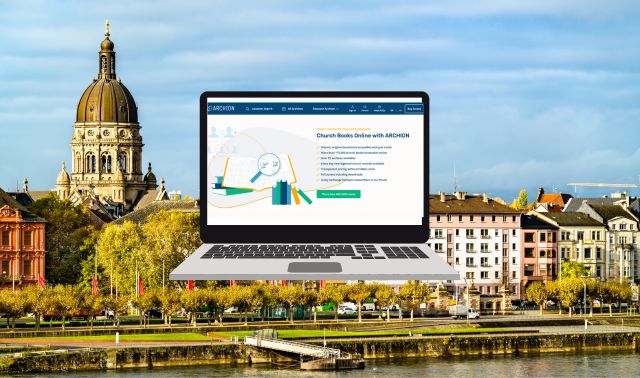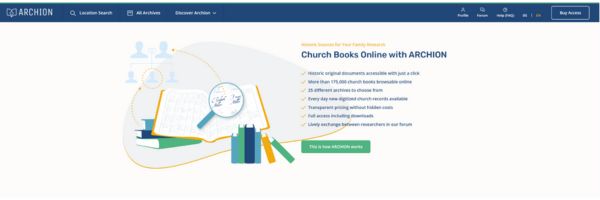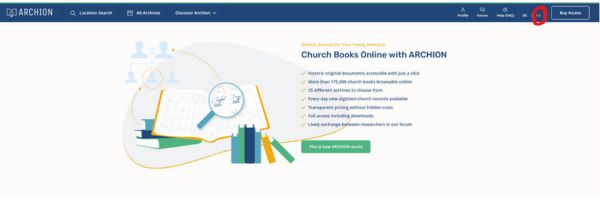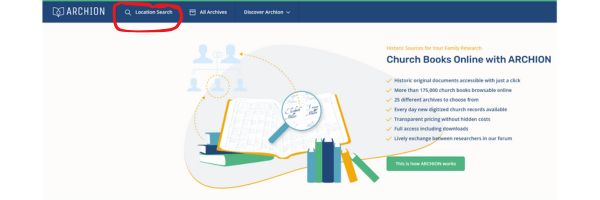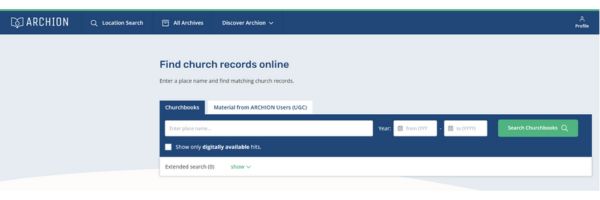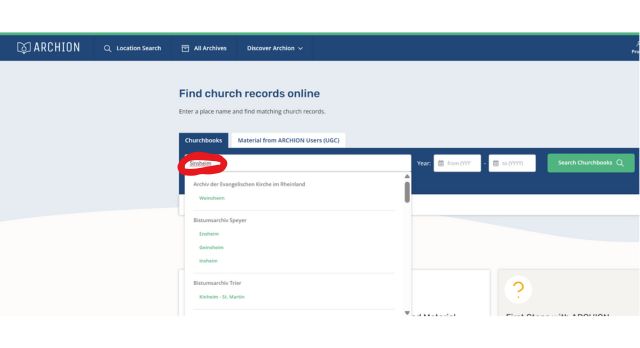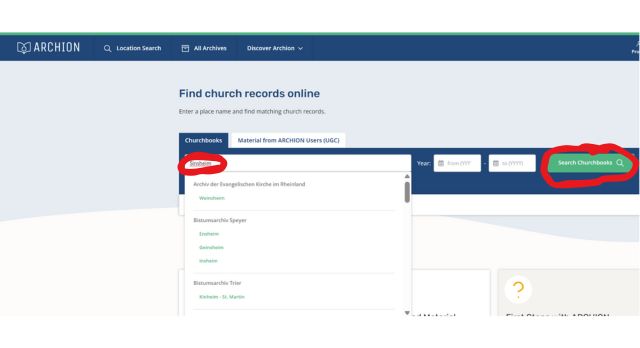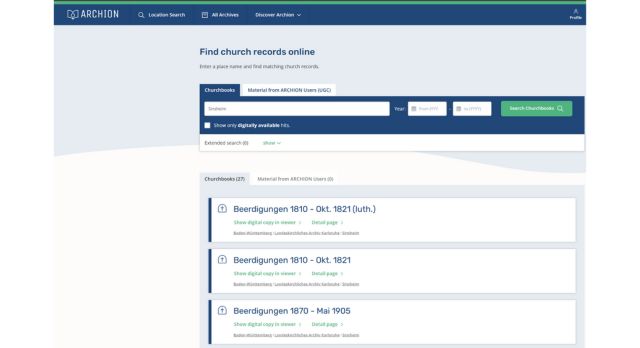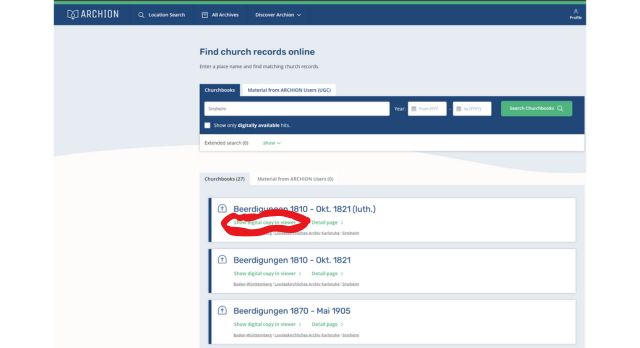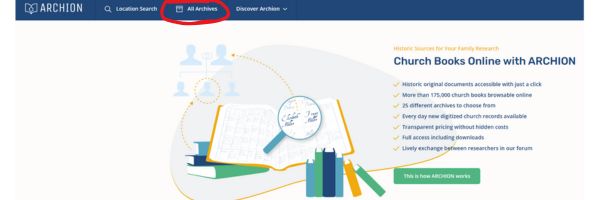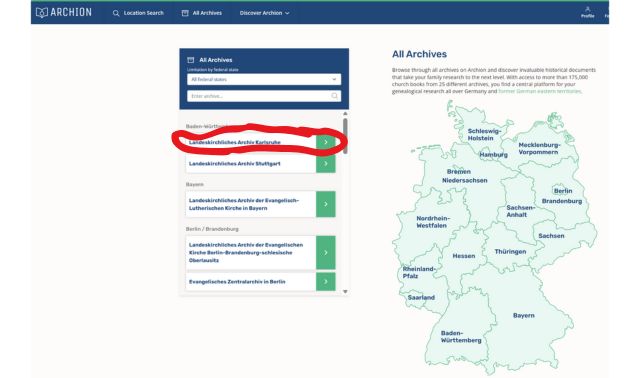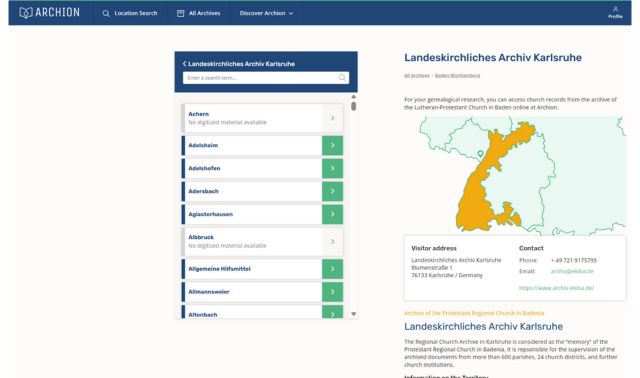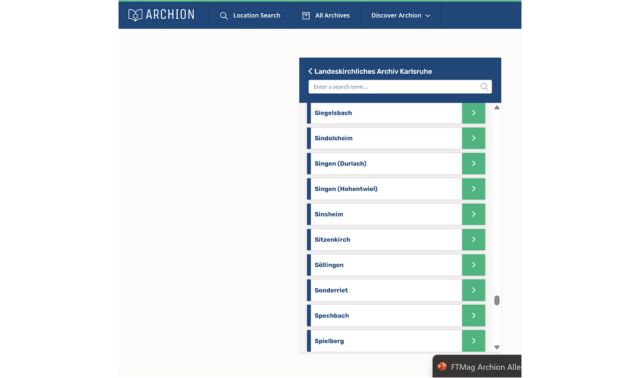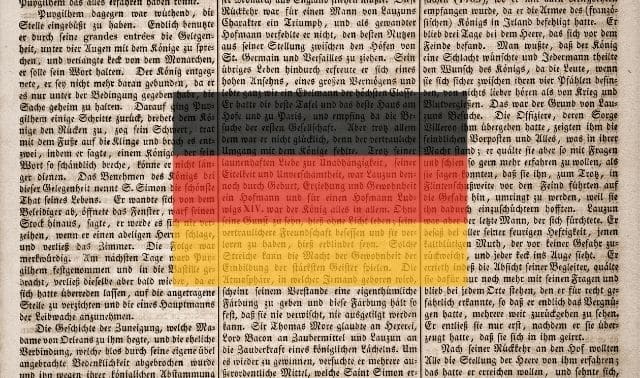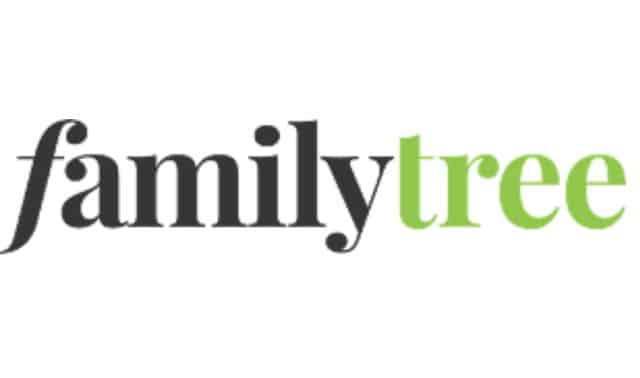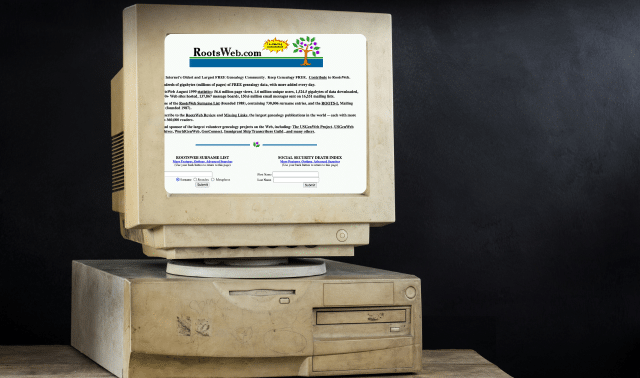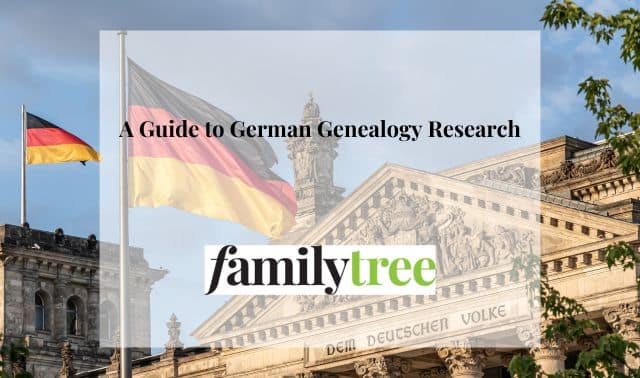If you have German Protestant ancestors—and in the last five centuries between half and two-thirds of the people of Germany have been of this religious confession—then one European-based website stands out above all the others, and that’s Archion.de. These church records are especially important in documenting the births, marriages, and deaths before civil registration began in the 1870s, and sometimes contain added information about people more recently, too.
Despite the fact that it is not a totally free site (although subscriptions start at less than 20 Euros, which is less than $25), Archion has the advantages of allowing the user to choose an English-language interface and also enabling non-subscribers to look at which parishes’ registers exist (and from what time periods). And although Archion started as a purely Protestant records site, it has expanded to include records from a Roman Catholic diocese, too.
German Protestant Historical Context
Church registers as we know them today were a happy byproduct of the Protestant Reformation that began in the early 1500s in German-speaking lands. Revolts began in the states that later became Germany—at the time they were loosely tied a polity known as the “Holy Roman Empire of the German Nation”—and Switzerland, against the authority of the Roman Catholic church, which until then was a hierarchal church monopoly in Western Europe.
The Roman Catholics, as well as the two major mainstream Protestant groups that emerged (Lutherans and Reformed), all wanted to know who was “on their sides,” and requiring church registers of baptisms, marriages, and burials were one way they had of keeping track of this. Another important strain of Protestantism, the Anabaptists (pacifist groups such as the Mennonites and Amish) who rejected infant baptism, were persecuted and took the opposite view of records since such written documents might lead to martyrdom. Most Anabaptists chose to leave Europe as a result.
Religious wars from the mid-1500s to the end of the Thirty Years War in 1648 led to a compromise in which the ruler of each German territory was entitled to choose to one of three faiths (Catholic, Lutheran, Reformed) as the established state religion. Importantly, many of the rulers practiced a degree of toleration so while the Reformed might be established, there often also would be Lutheran and Catholics allowed in that state.
The Road to German Protestants Today
As the Kingdom of Prussia rose to leadership in the German states after the Napoleonic period in 1817 its king forcibly united the Lutherans and Reformed as Evangelisch (which despite being a cognate of the English word “evangelical” has nothing to do with American Evangelical Christianity). Some parishes dissented from this union and are known as the “Old Lutherans.”
During the 1800s, the number of German states (and therefore the number of independent established state church bodies) was reduced. In the 20th century, the regional Protestant churches (many of which follow the borders of the states of the Second German Empire that was in existence from 1871 to 1918) have come together under the umbrella of the Evangelical Church in Germany (in German: Evangelische Kirche in Deutschland, known by the acronym EKD.) Some of the regional churches style themselves as Evangelical Lutherans, others merely as Evangelical; it’s best to think of them as generic, mainstream Protestants.
It’s under the auspices of the EKD that Archion began (originally as the equivalent of a nonprofit corporation known as Kirchenbuch Portal).
What Archion Provides
The Archion site has grown significantly and continues to expand; as of this writing, nearly 200,000 individual church register books have now been digitized. Every regional Protestant church of the EKD is now participating except the tiny city-state of Bremen, and Roman Catholic diocese of Hildesheim has also become a partner (FYI, other Roman Catholic dioceses are participating in the website Matricula.eu, which began digitization of German-language records in the old Austro-Hungarian Empire but has added several German dioceses).
One of the archives that’s part of Archion is Evangelisches Zentralarchiv in Berlin, which includes registers not only from Berlin but also has the registers that survived World War II from the areas of East and West Prussia and Posen, areas that now are under the authority of Poland.
On the website, you can access an English-language version of the site for free, as well as look at what registers exist for a certain parish, and whether those registers are available digitally. Creating a log-in is also free, and this enables you to participate in forums with other Archion users, and is also needed to purchase a subscription. You also have the option to receive a monthly email newsletter, which give you updates on church books that have been newly digitized.
Something that’s notable for longtime researchers (who most cases would have used FamilySearch’s digital scans made from old analog microfilms) is that Archion in some cases had been copies because of newer technology and also better attention to detail in flattening out the church books with tight bindings in which data (and names!) were lost to researchers. On the other hand, it’s sometimes the case that the writing in the church books has faded since FamilySearch originally microfilmed the books, producing a fainter copy in Archion. The best tip is access both if possible!
Purchasing Access to Archion
To view digitized church registers or download copies, users need to purchase a pass that grants access for a specific time period with a limited number of downloads. Archion offers different subscription plans:
- 30-day access: 50 document downloads
- 90-day access: 150 downloads
- 1-year access: 600 downloads
Extra document downloads in increments of 25 can also be purchased separately. You should carefully choose your package since, for example, the lowest-level monthly passport will expire exactly thirty days after you book it. It also seems strange to American eyes that the site has no plan that allows for unlimited downloads, but Germans in general are a people more used to limits and less into the “all you can eat” concept. Taking screenshots of the pages is also not explicitly disallowed under Kirchenbuchportal’s terms and conditions.
Users can access church books through Ortssuche (Location Search) or Alle Archive (All Archives). The Ortssuche function allows direct searches by village name, while Alle Archive navigates through archives, church districts, parishes, and finally, individual church book volumes. In neither case are names in the registers searchable.
In cases where the registers on Archion are also found on microfilms in the FamilySearch system, you’ll need to make note that Archion lists the holdings of a particular parish by what’s in each Band (volume) whereas FamilySearch cataloging, especially on older microfilms, usually lumps together volumes and may obscure chronological gaps in the records.
Browsing Records with Ortssuche
Ordinarily you’ll probably want to start with the Location Search (the “All Archives” search may be your better alternative if you don’t find anything for the village name you are seeking, or if you find too many villages of the same name and are confused as to which one is your parish village of that name).
Here’s a sample step by step of the Location Search, which we’ll do in English since more accessible.
Step 1 – Go to Archion.de
Step 2 – Click on EN on the upper right-hand side of the top tool bar to use the English interface
Step 3 – Click on the magnifying glass next to “Location Search” on the upper left-hand side of the home page.
Step 4 – This brings up a dialog box to fill in a place name and also years beginning and ending for the church books you’re seeking (normally you’ll let the years fields blank).
Step 5 – Fill in the village name (Let’s choose “Sinsheim,” a unique village name in Germany).
Step 6 – After filling in “Sinsheim,” click on “Search Churchbooks” (Note that Archion also will offer other search ideas based on the spelling you submit. Normally you’ll ignore these unless you made a typo in your village name!)
Step 7 – A list of the individual registers will appear, stating what type of pastoral acts are included in the registers (many are simply labeled Mischbuch, which means it has “mixed records,” of baptisms, confirmations, marriages, burials and sometimes other records) and what dates they cover.
Step 8 – Select a relevant time period by clicking on “Show digital copy in reader.” The scans of the church register will appear for you to browse through.
Step 9 – Use the controls to scroll and browse through the images. You can lighten, darken, enlarge, and download.
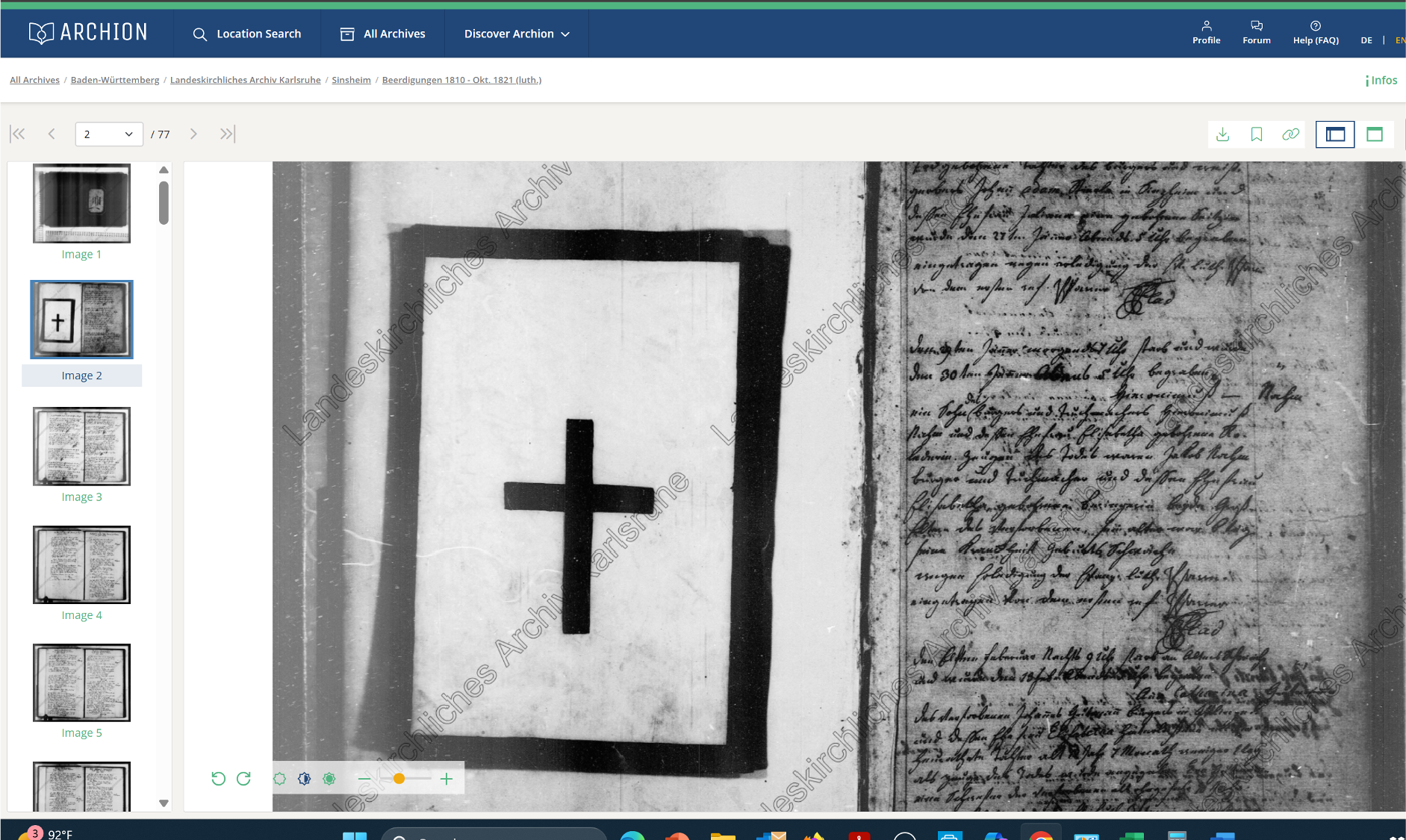
Note that normally if a village previously had both a Reformed and Lutheran church that there will be separate record books for each congregation, in which case you’ll find registers with overlapping time periods.
Browsing Records with Alles Archives
Choosing this method of drilling down to the parish level does give you a better overall feel for Archion and as noted earlier, can be helpful if you know the basic area in which your German village lies.
Step 1 – Click on “All Archives” on top left-hand side of home page.
Step 2 – Either fill in a German state name or particular Archive if known (you can also use the map on the right-hand side of this page to drill down).
Step 3 – Choose an archive on the left-hand side.
Step 4 – This brings up a list of parishes with records in that archive (note that if the parish has no digitized materials, this will be noted but you can still click on it to see what undigitized records it has).
Step 5 – Again we’re scrolling down and choosing Sinsheim, and you’ll get the same listing of individual registers to browse.
List of participating archives
In the case of most archives for the regional churches, only a portion of their records have been digitized (shown in green)
Archion provides valuable access to church records that might not be available elsewhere. Some records can be accessed for free upon registering for an account, but most require a membership
- Evangelisches Zentralarchiv in Berlin (Berlin, plus Prussia and many formerly German eastern areas)
- Landeskirchliches Archiv der Evangelisch-Lutherischen Kirche in Bayern (Bavaria)
- Landeskirchliches Archiv der Evangelischen Kirche von Westfalen (Westphalia)
- Archiv der Evangelischen Kirche im Rheinland (Rhineland)
- Archiv der Lippischen Landeskirche (Lippe)
- Landeskirchliches Archiv Hannover (Hannover)
- Landeskirchliches Archiv der Evangelischen Kirche Berlin-Brandenburg-schlesische Oberlausitz (Berlin-Brandenburg-Silesian Oberlausitz)
- Landeskirchliches Archiv Karlsruhe (Baden)
- Landeskirchliches Archiv der Evangelischen Kirche von Kurhessen-Waldeck (Kurhessen-Waldeck; Electorate of Hesse and Waldeck)
- Landeskirchliches Archiv Stuttgart (Württemberg)
- Zentralarchiv der Evangelischen Kirche der Pfalz (Palatinate)
- Landesarchiv Speyer (Rhineland-Palatinate)
- Landeshauptarchiv Koblenz (Rhineland-Palatinate)
- Zentralarchiv der Evangelischen Kirche in Hessen und Nassau (Hesse and Nassau)
- Landeskirchenarchiv der Evangelischen Kirche in Mitteldeutschland/Magdeburg (Saxony and Thuringia)
- Landeskirchenarchiv der Evangelischen Kirche in Mitteldeutschland/Eisenach (Thuringia)
- Archiv der Evangelischen Landeskirche Anhalts (Anhalt)
- Landeskirchliches Archiv der Evangelisch-Lutherischen Kirche in Norddeutschland (Protestant-Lutheran records from Schleswig-Holstein, Hamburg, and Mecklenburg-Vorpommern)
- Niedersächsisches Landesarchiv (Lower Saxony, with records of the Protestant-Lutheran Regional Church Schaumburg-Lippe)
- Landeskirchliches Archiv der Evangelisch-Lutherischen Landeskirche Sachsens (Protestant-Lutheran records from Saxony)
- Archiv der Evangelisch-Lutherischen Landeskirche Oldenburg (Oldenburg)
- Bistumsarchiv Hildesheim (the Catholic Diocese of Hildesheim, including the important cities of Braunschweig, Celle, Göttingen, Hannover, and Hildesheim)
- Evangelisch-reformierte Kirchengemeinde Hannover (Reformed Protestant Church in Hannover)
- Landeskirchliches Archiv der Evangelisch-lutherischen Landeskirche Hannovers (Protestant-Lutheran Regional Church in Hannover)
- Landeskirchliches Archiv der Evangelisch-lutherischen Landeskirche in Braunschweig (Protestant-Lutheran Church in Braunschweig)
- Archiv der Mennonitischen Forschungsstelle (Mennonite records)
- Bistumsarchiv Speyer (Catholic records from Rhineland-Palatinate)
Related Reads
A version of this article was posted online in June 2017. Last updated: July 2025

